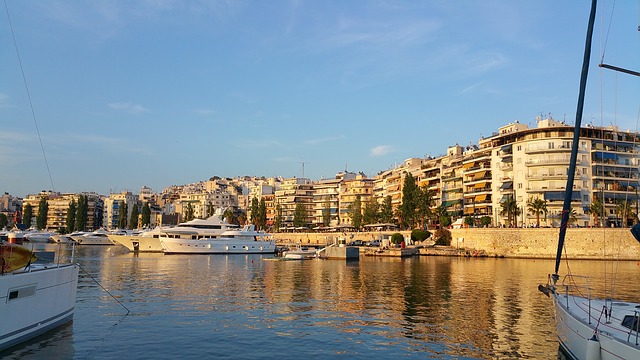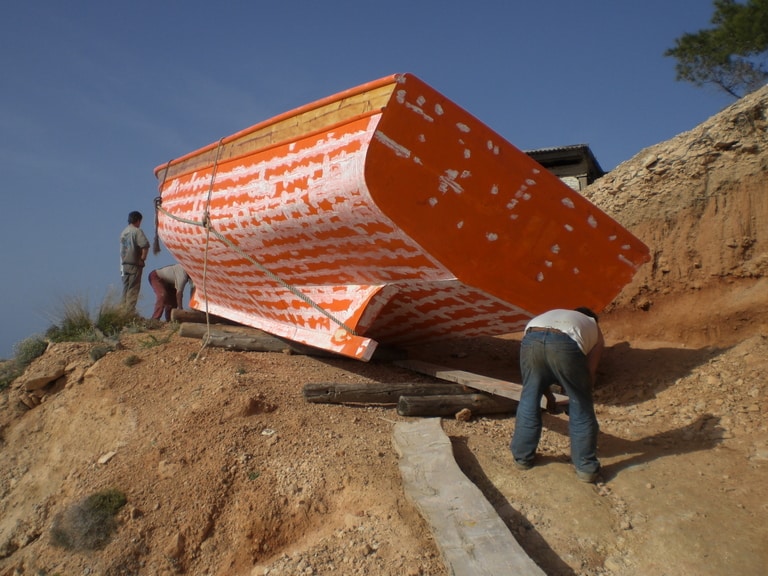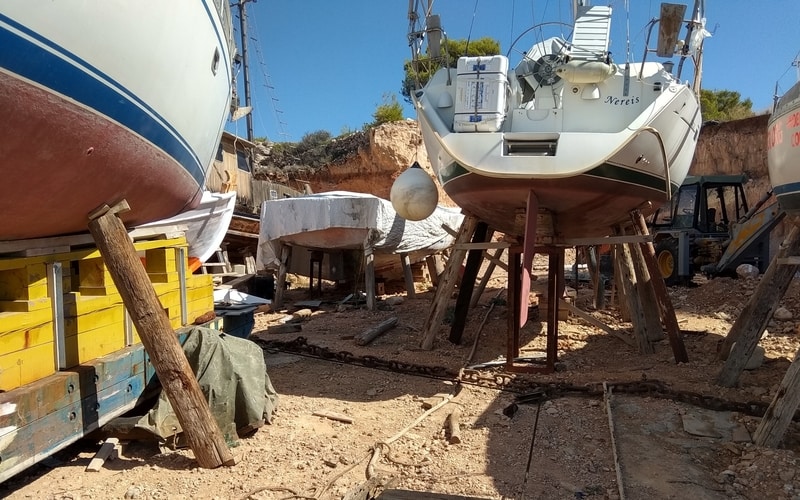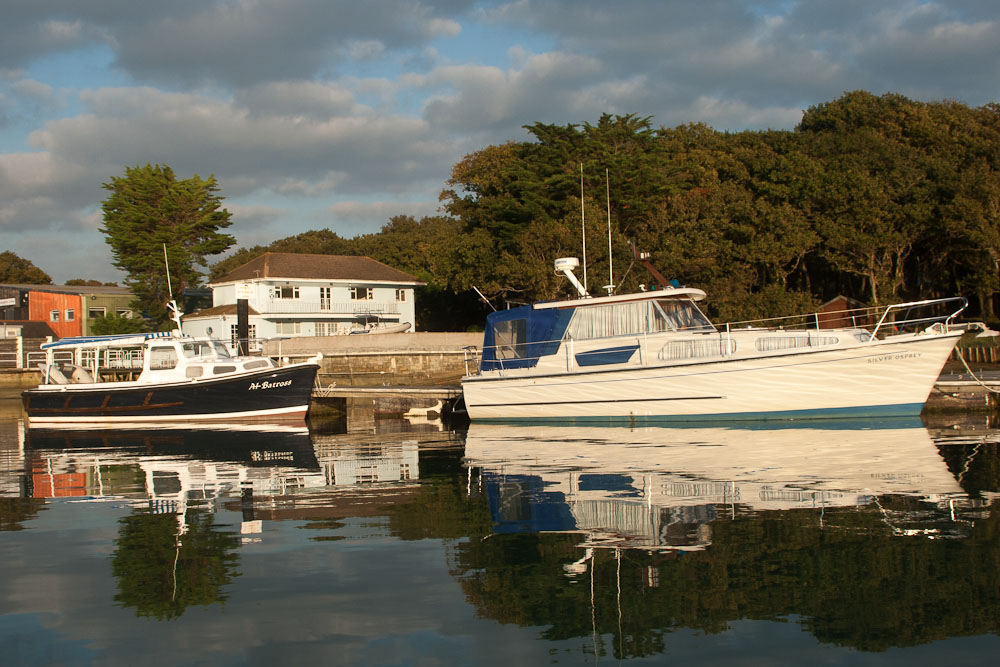Have you heard the one about the Brussels’ bureaucrat who gave the Greek guy six million Euro? No, this isn’t the beginning of a joke; but a farce played out when our little island’s application to the European Regional Development Fund for a new harbour was met with approval. The procedure works as follows: after EU Commission approval of plans and costings, EU taxpayers’ money is put in a ring-fenced ‘Escrow’ account, a senior official of the host country is then identified as the controller of the funds. That official pays the architect in advance for materials and when satisfied with the work, the architect pays the contractors. What could possibly go wrong?
When our elected island Mayor burst in to the Café Nio and made the announcement that our Application had been approved, his excitement soon transmitted around both the island’s villages. At last we’d be free from tying boats to big stones, getting our feet wet every time we went aboard and risking the lives of small children being handed up from the sea. At 6m Euro, we’d have a new quay with tying rings, a pontoon and a long western quayside where the ferry boats could come in allowing us to bring vehicles to the island. This would be transformational!
Near the mouth of Piraeus Harbour on the north side there’s a fairly newish building on four storeys. Painted in Greek blue and white colours, it houses the Greek Admiralty and Civil Maritime Authority. On the third floor was the office of the nominated official who had control of our Harbour funds: all six million euros of it. So what did he do almost immediately upon receipt of this money? Examine the naval architect’s plans and staged schedules for release of payments? Go over the quantity estimates for cement and enormous breaker stones coming on craned barges from Lesbos? Of course not. On his government computer he opened an account with 888.Com Poker and immediately clicked the Platinum option.

Playing around the world against real people for real money, this elevated status allowed our trusted official to play with the assistance of computer predictions. So with every hand dealt to him, he received an estimate of the probability of winning. He chose only to gamble high on hands where he had the computer’s highest level of advice: ie a 96% chance of winning. Every other hand he just threw in. And playing 5,000 euro per hand he was soon ahead. With every win, he fed his mother’s personal bank account and continued to play with the free money stupidly provided by these idiots in Brussels.
When the architect requested the first staged payment of 2.3 million euros, our friend cheerily transferred the money and continued playing. Similarly the second and third stages. Our harbour was coming along nicely and it was fascinating to sit in bars watching the ships deliver materials and the machines churn out the concrete as our harbour progressed. One afternoon I was sitting drinking ouzo with a friend on his balcony only eight feet from the Med when his son rang. That was unusual because, as a naval officer in the Maritime Authority in Piraeus, he was quite a busy man. As my friend talked to his son, I could hear the son yelling:
‘Dad. Turn on the TV. ERT Channel. Turn it on now!’
In a matter of seconds we were glued to the screen watching as an officer was being led from the building in handcuffs. An announcer was shouting to be heard over the helicopter blades about how when the fourth and last stage of our harbour payment was requested, a delay had occurred. And then another and another. Suspicious, the architect called Brussels and quoted the ring-fenced account number to be told that the whole funds had been transferred well over a year before. The game was up. With a 96% chance of winning, there is a 4% chance of losing and our friend had lost; wiping out the remainder of the free money.
When taken to court, like all criminals except murderers, in Greece one can buy-out any prison sentence imposed. So when the judge said ‘five years or a 50,000 euro fine’ our trusted friend offered payment there and then; from his dear old mother’s account. We ended up with a three-sided harbour which is hopeless much of the time. The deep side was never built, so the ferry boats can’t come. But we do get big private yachts.
One fine day when a lovely big sixty-foot three deck yacht tied up, because she was flying the Greek flag, we were curious as to whom the owner might be. Yes, you guessed it. Bought with an ‘inheritance’ from his beloved mother, the owner sat in the Café Nio and boasted about the day he received a phone call from some guy in Brussels.
By contrast with our harbour debacle, our boatyard is run by three generations of honest, skilful, hard-working men. I say men, because the third generation has just turned eighteen.

‘Papoos’ or grandfather Adonis has built nine traditional wooden boats in that yard, all still in use. The first three of them he built when there was no electricity on the island. I found it fascinating to watch him day by day (with electricity in my time) build these solid eight metre wooden boats. When we launched the hull of ‘Number 8’ down two telegraph poles he’d rigged up, I let out a cry which caused the two men with lines curled round the poles to halt the boat half way down:
‘Yiannis! Yiannis! Ti va kaveis;’ (John! John! What’s the problem?’)
With my hand on my pumping heart, I was relieved to have averted a catastrophe.
‘You’ve forgotten to put the bung in the bottom of the boat.’ I proudly announced.
Now I’m a man who’s used to being robed in the mornings by both senior and junior robers. Someone else brushes the tails of my morning coat, checks my brass shirt studs aren’t showing and polishes my shoes before giving me the nod to appear in public. So I’m unused to people laughing at me. But laugh they did. Around a dozen men were rolling with laughter at my proud announcement. When I looked askance at Vangelis (the middle generation) he put a friendly hand on my shoulder, spluttered his laughter to a stop and explained:
‘The first thing my father does after building a boat is to sink it. We leave it in the sea for a week and then haul it out. When it’s dried in the sun for another week, the next thing we do is set the boat on fire. You will see. Now let’s get this boat into the sea.’
It was all beginning to make sense. The pine timbers would swell in the sea to the point where the salt made them rock hard. This boat had taken his father over a year to hand-build in all weathers, so watching Vangelis spray it with petrol was a bit daunting. But he did have a piece of string wrapped around the flywheel of the engine in the old power washer and its inlet connected to a patched-up fresh water supply from up the mountain. When the moment came to light it, Vangelis asked me to step forward. As the orange flash flew up into the clear blue Greek sky, I stopped breathing. But after a matter of seconds, just long enough to kill all and any bugs on the exposed surfaces of the timbers, Vangelis sprayed her with water and the flames were quickly extinguished. As soon as possible he painted the whole thing in a red lead, oil and pig fat mixture; the exact ancient recipe being a closely guarded secret. He swears that this treatment keeps the timbers good for forty years and, after removing all paint or varnish, can then be repeated.

The mighty 4 HP winding engine in the yard was built in Glasgow over a hundred years ago. The chains we use to hold the drag cables for hauling boats out of the sea were all ‘acquired’ from World War 2 ships sunk by the Germans in Piraeus harbour. The 20 metre long sliders or ‘Skala’ are all hand-built and range in size from suitable for small boats up to 20 tonnes which, assisted by laying animal fat and old diesel oil on the railway sleepers, is the maximum that old 4HP winding engine can handle.
Our little island boatyard is much more than a place of work. It’s where Greek men come to get away from their wives. It’s where we gather once a year to go over the sea to visit the church of Agia Marina. Papoos Adonis is not alone in not flying the flag of the Greek State. On his boat he proudly flies the flag of Agia Marina; a much older protector of sailors than those cigarette smoking lazy so-and-sos in Piraeus. Also, at Easter we gather to dance, drink, eat and tell stories of voyages gone well and not so well. Yes, it’s dusty. Yes, it’s fraught with trip hazards and the ever present threat of visiting bureaucrats demanding bribes. But for all that there is real friendship, help willingly provided without payment and that most important of things when one is learning about boats and the surrounding seas: reliable honest advice.

